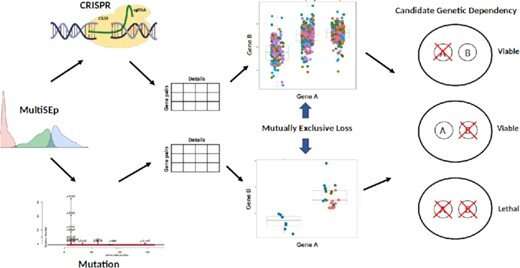In a groundbreaking first, research led by Queen’s University Belfast has found thousands of “Achilles Heels’ or ‘cancer vulnerabilities’ in an analysis of more than 700 different cancer cell types.
In the future, this could lead to new ways to stop cancer cells in their tracks by using existing drugs, as well as proposing new targets for drug development.
These drugs could even be used to combat cancers that are resistant to the current standard treatments.
The research has been published in the journal Nucleic Acids Research.
To conduct their study, the researchers created a computer program called “MultiSEp’ that analyzes large and complex datasets.
Dr. Ian Overton, senior lecturer from the Patrick G Johnston Center for Cancer Research (PGJCCR) at Queen’s University, said: “Understanding the molecular fingerprints of cancer can pinpoint ways to target drugs precisely to those patients where they will be most effective. Our work makes a step towards more effective and personalized cancer treatments, ultimately saving lives.
“We make our results available on the “Synthetic Lethality with Genetics and Genomics’ web server, opening a window to share these rich resources with researchers across the scientific community—in order to accelerate progress in cancer research globally.”
Cancers usually have many mutations which can cause genetic weak spots or “Achilles Heels.” For example, cancers frequently become more dangerous by mutating to stop some protective genes called tumor suppressors—leaving the tumor reliant upon a back-up gene.
Hitting the back-up gene with a ‘chemical hammer,” can therefore kill the cancer cells.
This new program has identified thousands of back-up genes in more than 700 different kinds of cancer cell types, providing the intelligence to design more effective treatments in the war against cancer.
Dr. Simon McDade, senior lecturer from the PGJCCR at Queen’s University, said: “This research represents an important resource for researchers worldwide to extract invaluable data from functional genomics screens, that has potential to translate to significant benefits for cancer patients in the long term, but also, for researchers around the world to easily and more efficiently analyze genetic data.”
Mark Wappett, PGJCCR honorary lecturer at Queen’s University and Head of Bioinformatics at Almac Discovery, who led the research, said: “Our results provide the wider scientific community access to key datasets generated by cutting edge technologies, and a toolkit with which to analyze this data.
“Ultimately, we hope that, by increasing the reach of this data we can expedite more targeted and effective cancer treatments.”
New computational method detects disrupted pathways in cancer
More information:
Mark Wappett et al, SynLeGG: analysis and visualization of multiomics data for discovery of cancer ‘Achilles Heels’ and gene function relationships, Nucleic Acids Research (2021). DOI: 10.1093/nar/gkab338
The results of MultiSEp are available at www.overton-lab.uk/synlegg
Provided by
Queen’s University Belfast
Citation:
New DNA research could help combat cancers resistant to current treatments (2021, May 24)
retrieved 24 May 2021
from https://medicalxpress.com/news/2021-05-dna-combat-cancers-resistant-current.html
This document is subject to copyright. Apart from any fair dealing for the purpose of private study or research, no
part may be reproduced without the written permission. The content is provided for information purposes only.



